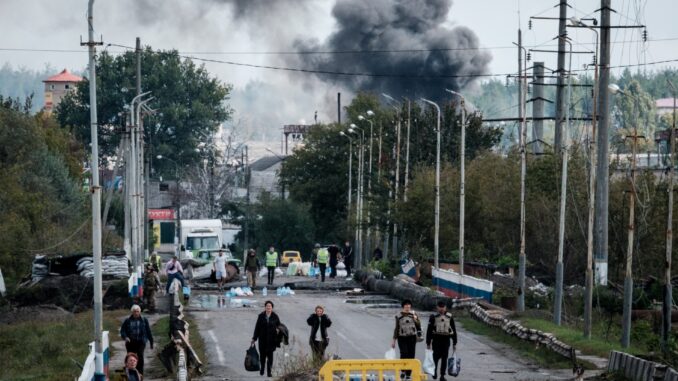
As the Ukraine war enters into the eighth month, the US and its Western allies have suddenly intensified their incessant propaganda campaign – claiming that the Ukrainian army is now snatching back the lost territories from the demoralized Russian armed forces. As per the bragging of the Western analysts and military experts, Russia is sinking deeper into this quagmire and its image as a fighting force is practically “shattered”. Western analysts are trying to portray Russia’s military as an ill-disciplined fighting machine that is equipped with obsolete weapons and supported by an antiquated supply chain and logistical support. Their main argument stands on two premises: One, despite seven months of fighting, Russian military has not been able to move beyond the Donbas, an area which was occupied by the Russian forces in the first few weeks of the invasion, and two, the recent “successful” Kharkiv counteroffensive launched by the Ukrainian army.
This Western propaganda is further fueled by the claims of Ukrainian President Volodymyr Zelenskyy that Ukrainian service members have liberated more than 2,300 square miles of the country from the Russians. The Western capitals have been celebrating the Kharkiv episode as the beginning of the end of the Ukraine invasion. They assert that the weapons provided by them, particularly the M777 howitzers and HIMARS, are helping the Ukrainians to outfight the Russians. This argument is being fanned in the backdrop of the “paralytic halt” in the Russian territorial infiltration of Ukraine since March. But the fact is that the Russian military is not “inept and incompetent” as being projected by the Westerners – Donetsk and Luhansk are predominantly under Russia as well as a large swath of southern Ukraine. The question is what constitutes a “loss or win” for Ukraine and its Western supporters and where will they draw the line?
Yes, discipline in Russian military units is reported to be low, and Russia has, in seven months, lost more soldiers than the USSR did in nearly a decade of its attempt to invade Afghanistan. This is also true that there are major supply chain and logistical hindrances that are drastically impeding the ground operations of the Russian army. But, writing off the Russian army altogether as a useless war machinery is utter inanity.
To move further inside Ukrainian territory and then maintain its control, Russian army needs massive logistical support that is technically very difficult to execute, and it will put inordinate financial pressure on Russian economy, which is already being subjected to the stringent possible international sanctions. Vladimir Putin, knowing well about these limitations, seems to be content with 20 percent of Ukrainian land in southern and eastern parts of the country – perhaps this was primary objective of his attack on Ukraine. Further infiltration of the Ukrainian territory is not viable for Russia at the moment – tactically and financially. “The main goal is the liberation of the entire territory of Donbas,” is how Vladimir Putin responded to the questions of journalists at the just-concluded SCO summit in Samarkand. Factually speaking, Putin is achieving his objectives in Ukraine as per his own pre-defined timetable.
The prime objective of the Western countries is to ensure that Russia incurs even greater losses in this war. Washington is taking full advantage of the Ukrainian crisis, while the European countries are paying a very high price in different ways. First, the European countries are inordinately dependent on Russian natural gas and oil. With the war in Ukraine lingering on without any endgame in the sight, European gas and oil prices are skyrocketing and wreaking havoc on their economies. Soon, it will begin to aggravate the cost-of-living crisis throughout the continent- the heat of this looming crisis can be felt in the form of growing anxiety on the streets and roads of the European continent. Second, after the Russian attack, millions of Ukrainians have fled their homes to seek refuge in other European countries. Although, for the time being, almost all European countries are showing high-octane generosity in accepting the Ukrainians, but, in the mid and long term, the refugee problem will definitely hit the already dithering European economies even harder. Third, in view of the ever-growing Russian threat, European countries will be compelled to expand their defense budgets, putting further pressure on their economies.
The United States, however, it seems, is the least affected country by the situation arising out of the Ukrainian crisis. In fact, the US is a major beneficiary. Unlike European countries, the US is not dependent on Russian gas and oil. Therefore, it has a much deeper pockets at its disposal to sustain a large-scale war. The second benefit provided by the Ukraine episode to the US is the revival of NATO, the future of which was in complete disarray until the Russian forces crossed the Ukrainian border in the last week of February.
With the Russian invasion of Ukraine, the US found the best possible opportunity to consolidate and revive the fading NATO alliance. The pace with which the new Nordic members, Finland and Sweden, were inducted into its folds, is a testimony to the vulnerability of the European countries in the face of any big war. In addition to resuscitating NATO from the death bed, the United States has also utilized the evolving situation to its advantage by increasing its military presence in Europe. Hosting large number of US troops in normal circumstances would have not been a welcome step for the Europeans, but in their urge to safeguard against any possible Russian aggression, now they have readily allowed the US to station more than 100,000 troops on their soil – the highest number of US soldiers in Europe since the World War Two. Factually speaking, the war in Ukraine has enabled the US to reassert its control over its allies. The White House has many reasons to be cheerful.
Dr. Khalid wrote from Karachi, Pakistan.
END

Be the first to comment